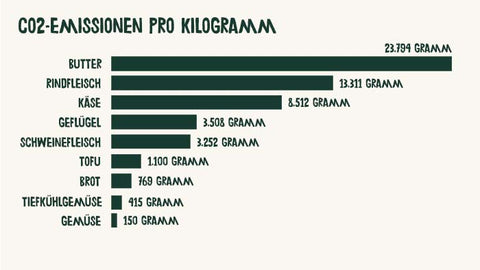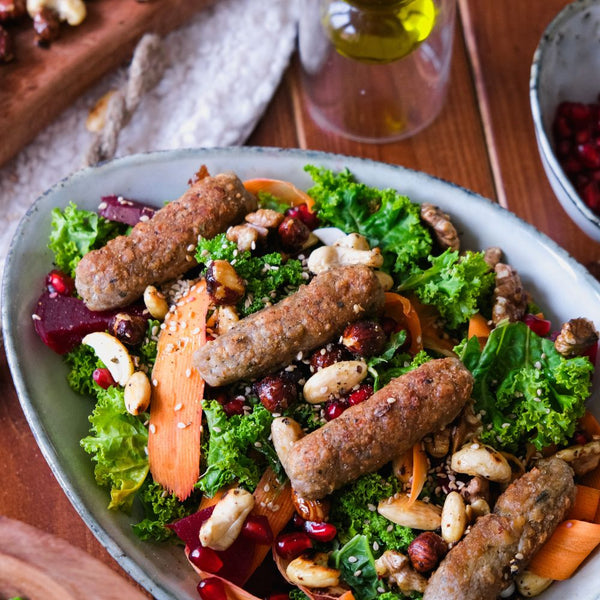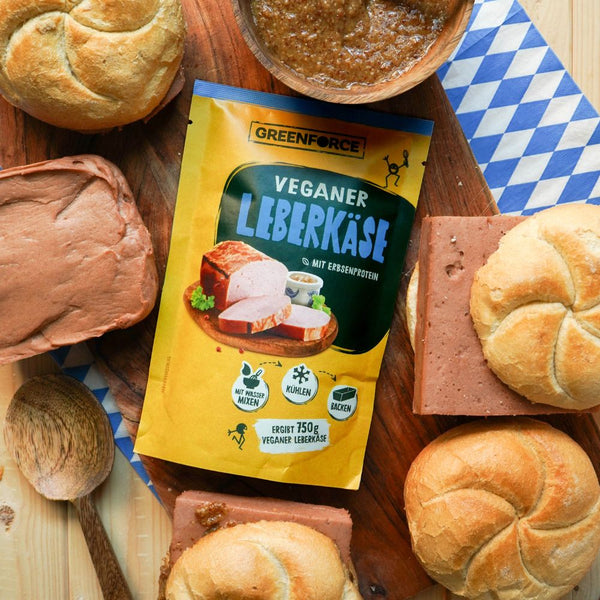What does it mean for the environment if you only eat a plant-based diet? What does it mean for the environment if we continue as before and consume a lot of meat? After all, meat is one of the biggest environmental sins of all. Factory farming is responsible for 15 percent of all greenhouse gas emissions. That's more than all planes, cars and trains combined consume. So what is really more sustainable?
The consequences of meat consumption for the climate and the environment
On average, every German eats around 60kg of meat every year. In America it is even 100kg per person per year. In Ethiopia, however, it is only 6kg. In developing countries, meat consumption is a luxury; it is a celebration when meat is on the table. This used to be the case with us too, where meat was served on special occasions. Industrial animal husbandry made meat cheaper and more accessible to many.
Meat usually comes from large livestock farms where the animals are not kept in a species-appropriate manner. Cattle, pigs and poultry emit greenhouse gases that contribute significantly to worsening the climate. Cattle excrete methane gas during digestion, which heats up the climate about 25 times more than carbon dioxide.
But greenhouse gases are not only created through husbandry. Also in the production of animal feed. Huge areas are required. The deforestation and, above all, the utilization of the areas lead to a decline in biodiversity and the destruction of important CO2 stores.

Graphic: Source sz.de
But other animal foods are also harmful to the climate. The production of butter uses significantly more CO2 than that of beef. The consumption of CO2 emissions in the production of cheese is hot on the heels of beef.


Soy vs. pea
Many vegans turn to alternative products such as soy shreds or tofu. But here, too, there is often criticism that the rainforest is also cut down to produce soy, which also causes a lot of greenhouse gases. However, that's not entirely true. Only 2% of soybeans grown worldwide is used to make these products. The rest is processed into feed for livestock.
There are many other alternatives to soy in vegan/vegetarian products. For example, we use pea protein for our Easy To Mixes. The pea protein scores particularly well with its high biological value, which means that it can be easily absorbed by the body. But that is not all. Peas require significantly less water to grow than, for example, almonds. Approximately 200 times more water is required to produce almond milk. In addition, pea plants naturally enrich the soil with nitrogen, meaning that harmful fertilizers can be avoided.
Conclusion: balanced diet
Now what does this all mean? Should you completely avoid animal products? Or is it okay to eat a piece of butter?
Vegan nutrition definitely has positive effects on the climate and the environment. One solution is a balanced diet. If you can't or don't want to do without meat or other animal products, you should reduce your consumption significantly (1-2 times a week). And if animal products are used, then only regionally and preferably from a trusted farmer.
When consuming plant-based foods, attention should be paid to regionality and seasonality in order not to harm the ecological balance. This saves transport routes, reduces the use of artificial fertilizers or pesticides and minimizes the consumption of water, energy and CO2.
If you choose meat alternative products, you should also pay attention to the production method and origin of the products. For example, our products are all produced in Germany and sent to your home from there.

Finally, we would like to say that we should generally be more conscious and economical with food.
It is a luxury that we must preserve. Food waste and packaging waste is also a big issue,
that you shouldn't sweep it under the table. Help us make the world a little greener and more sustainable!
You can find out more about sustainability at GREENFORCE here .
Sources:
- http://www.fao.org/ag/againfo/resources/en/publications/tackling_climate_change/index.htm
- https://www.kamelur.de/blog/ist-vegan-essen-really-besser-fuer-die-umwelt
- https://www.zeit.de/wirtschaft/2013-11/soja-balance
- https://www.ecowoman.de/ernaehrung/essen/erbsenprotein-erbsenmilch-kaufen-nutz-nachteil-wertigkeit-nachhaltigkeit-9307

















